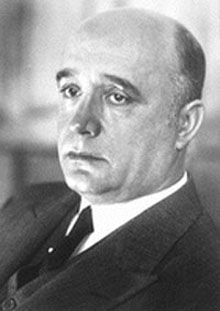| Friedrich Bergius  Born: 11-Oct-1884 Born: 11-Oct-1884
Birthplace: Goldschmieden, Germany
Died: 30-Mar-1949
Location of death: Buenos Aires, Argentina
Cause of death: unspecified
Gender: Male
Race or Ethnicity: White
Occupation: Chemist Nationality: Germany
Executive summary: Hydrogenation of coal Military service: German Army (1904, one year) The son of a chemical factory owner, Bergius was educated at Breslau and Leipzig and other cities, working with Walther Nernst and Fritz Haber, eventually founding his own laboratory in Hanover. He later became an employee of Karl Goldschmidt, rising to deputy member of the board of Goldschmidt AG. Work that he did at the Mannheim-Rheinau Works on the hydrogenation of coal, while not immediately successful, was used by I.G. Farben in the 1930s to produce fuel. With Carl Bosch he received the Nobel Prize in Chemistry for his work in this and other industrial chemical methods. That worked proved of the utmost importance in extending Germany's participation in the second World War. After the war his association with companies close to the Nazi regime prompted him to relocate to Argentina, where he died in 1949.
University: University of Breslau (attended 1903)
University: PhD, University of Leipzig (1905-07)
Scholar: Technische Hochschule, Karlsruhe
Scholar: Technische Hochschule, Hanover (studied 1909)
Nobel Prize for Chemistry 1931 (with Carl Bosch)
Author of books:
The Use of High Pressure in Chemical Actions (1913, chemistry)
Do you know something we don't?
Submit a correction or make a comment about this profile
Copyright ©2019 Soylent Communications
|